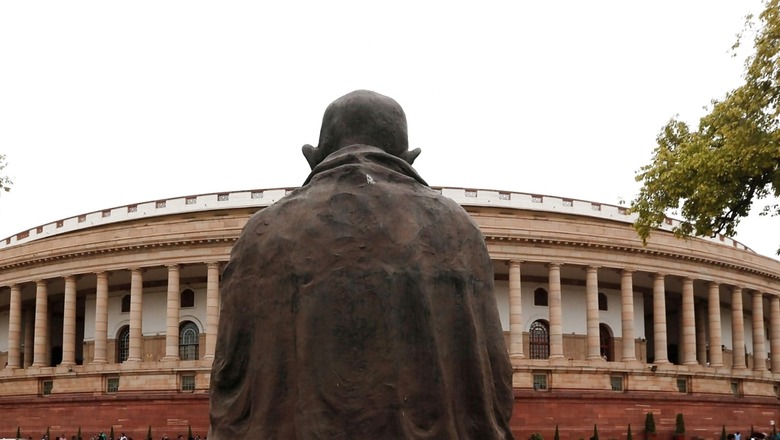
views
A Bill calling for companies to allocate a quarter of their CSR spend towards the upkeep of historical monuments saw intense debate in Rajya Sabha. Introduced by BJP MP Vinay Sahasrabuddhe as a private member’s Bill, it had the Upper House split with reports saying that further discussion is to be taken up over it. MPs are first and foremost legislators. Which means that it is their job primarily to make laws. Each and every MP, whether in the government or the opposition, is empowered to propose laws while the government and its ministers also push their legislative agenda during Parliamentary sessions. Here’s a look at what constitutes a Private Member Bill and the arc they are meant to follow in seeking passage through Parliament.
Who Is A Private Member? What Is A Private Member’s Bill?
A ‘Private Member’ is simply any MP who is not a minister. Thus, a member of the ruling dispensation who is not a minister or that of the opposition can be said to be a ‘Private Member’. When a minister introduces a Bill, it has the backing of the government of the day and is understood to be in line with its legislative goals. Such a Bill is known as a ‘Government Bill’. But when an MP other than a minister introduces a Bill, it is called a ‘Private Member’s’ Bill.
ALSO READ: When An MP Is Shown The Door For Crossing The Line. How Suspension Works In Parliament
How Does A Private Member Table A Bill?
The Lok Sabha Secretariat (LSS) says the main groundwork as regards a Private Member Bill has to be completed by the MP who wants to move such a Bill. “The Lok Sabha Secretariat nevertheless renders necessary assistance in putting the Bill in proper form so that it is not rejected on technical grounds,” it adds.
Intimation, or notice, for such a Bill along with its text has to be given a month in advance to the presiding officer of the House in question — the Speaker in Lok Sabha and the Chairperson in Rajya Sabha. However, the presiding officer may permit the Bill to be introduced at a shorter notice.
The notice of a motion seeking introduction of a Private Member’s Bill has to be “accompanied by a copy of the Bill and an explanatory Statement of Objects and Reasons”. The notice for such a Bill may also be given online through an e-portal. Further, the LSS says that once the draft of the Bill is ready, it has to be printed and uploaded on the e-portal for MPs at least two days before the date fixed for its introduction so that MPs can access it.
What Are The Specific Requirements For Tabling Such A Bill?
There are specific stipulations regarding the introduction of a Private Member’s Bill when it involves either any expenditure from the Consolidated Fund of India, delegation of legislative power to any executive authority, or an amendment to a principal Act. Further, for a Bill related to a subject where the previous nod or recommendation of the President is needed, the MP promoting the Bill has to attach a copy of such permission.
The Rajya Sabha Secretariat says that a member can give a maximum of three notices for introduction of a Private Member Bill during any session while the LSS says “a member cannot introduce more than four Bills during a session” although he or she can authorise “any other member to introduce the Bill, in which case the member who introduces the Bill becomes the member in-charge of the Bill”.
When Can A Private Member’s Bill Be Introduced?
The LSS says that “the last two-and-a-half hours of a
sitting on every Friday are generally allotted for transaction of… Private Members’ Bills”. However, it adds that the Speaker may “in consultation with the Leader of the House, allot any day other than a Friday for the transaction of private members’ business”. Also, in case there is no sitting of the House on a Friday, the Speaker may allot the stipulated time “on any other day in the week” for private members’ business.
How Successful Are Private Members’ Bills?
In its report for the 14th Lok Sabha, which had commenced in 2004, PRS Legislative Research had noted that no Private Members’ Bill had been passed by Parliament since 1970, when the ‘The Supreme Court (Enlargement of Criminal Appellate Jurisdiction) Bill, 1968′ was enacted. It had said that Parliament had till that time passed only 14 Private Members’ Bills with six having been cleared in 1956 alone.
But that has not prevented a large number of Private Members’ Bills from being introduced in each session. For example, Lok Sabha had listed over 200 such Bills for introduction on July 23 during this Monsoon Session. A raft of such Bills means that selection for their discussion is done through ballot and the Committee on Private Members’ Bills and Resolutions classifies the Bills according to their nature, urgency and importance. It is on the basis of its classification that the House then decides the relative precedence in each category.
But given the relatively short time allotted for their discussion and the fact that it is the government of the day, with its majority in Lok Sabha, which hogs the legislative business during a parliamentary session, most Private Members’ Bill lapse without discussion. For example, of the 328 such Bills introduced in the 14th Lok Sabha, only 14 (4.3 per cent) were taken up for discussion while none were passed.




















Comments
0 comment